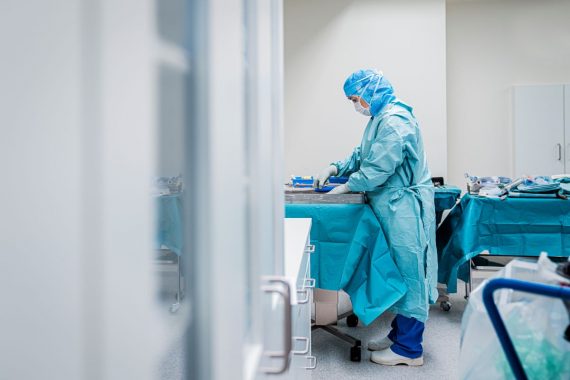A new antibody treatment to be used in the prevention and treatment of ‘acute’ Covid-19 infection has been approved by the UK medicines regulator.
Ronapreve, developed by Regenron/Roche, is the first novel monoclonal antibody treatment, developed specifically for targeting Covid-19, to be given the go ahead in the UK.
NHS England previously said that GPs may soon handle referrals of patients to receive such treatments.
And the DHSC told Pulse that ‘deployment details’ for Ronapreve, will be announced in due course – including which patients will be eligible to receive the treatment.
Monoclonal antibodies imitate antibodies produced naturally by the body to fight infections, and drugs are available for other conditions.
Ronapreve can stop infection, help resolve symptoms of acute Covid infections and lessen the chances of hospital admission for Covid-19, clinical trial data has shown.
It is intended to be a supplement to, rather than a substitute for, vaccination against Covid-19, the The Medicines and Healthcare products Regulatory Agency (MHRA) said.
The drug, named REGEN-COV in the United States, is taken by injection or infusion. It works by binding tightly to the virus at the lining of the respiratory system to prevent access to respiratory system cells.
Health secretary Sajid Javid said: ‘This is fantastic news from the independent medicines regulator and means the UK has approved its first therapeutic designed specifically for Covid-19.’
‘We are now working at pace with the NHS and expert clinicians to ensure this treatment can be rolled out to NHS patients as soon as possible,’ he added.
Meanwhile, another antibody drug has shown promising results in phase three of its trial.
AstraZeneca’s AZD7442 drug achieved a ‘statistically significant reduction in the incidence of symptomatic Covid-19’.
The paper said: ‘AZD7442, a combination of two long-acting antibodies (LAAB), reduced the risk of developing symptomatic Covid-19 by 77%, compared to placebo. The trial accrued 25 cases of symptomatic Covid-19 at the primary analysis.
‘There were no cases of severe Covid-19 or Covid-19-related deaths in those treated with AZD7442. In the placebo arm, there were three cases of severe Covid-19, which included two deaths.
‘AZD7442 is the first antibody combination (non-vaccine) modified to potentially provide long-lasting protection that has demonstrated prevention of Covid-19 in a clinical trial.’
The majority of the trial’s 5,197 participants were clinically vulnerable, with more than 75% with underlying health conditions.
Earlier this year, the Government announced that Tocilizumab – an anti-inflammatory monoclonal antibody usually used to treat rheumatoid arthritis – would be used to treat patients hospitalised due to Covid-19, after the RECOVERY trial showed it could help reduce mortality by 14% and time spent in hospital.
















